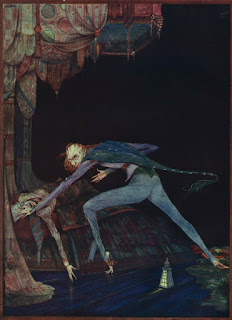BIOGRAPHY
He was born in 1873 in Kent (now, a quarter of London). He died at 83 years old. One of his ancestors was French, hence his surname, "De la Mare". Somebody said also that he was a relative of Robert Browning, the famous poet, but it wasn’t true. When he was 23, he started working for the Standard Oil Company to provide for his family; but he also found time to write. At 26, he married the actress Elfrida Ingpen, then years older than him, and they had four children.
When he was 35, thanks to Sir Henry Newbolt (a poet, historian and a government adviser), he got a pension from the government that allowed him to write full time.
He wrote mainly poems for children, e.g. Peacock Pie, tales as Collected Stories for Children, and also horror stories, e.g. Eight Tales. He wrote a surrealistic novel too, Memoirs of a Midget, awarded by the James Tait Black Memorial Prize.
About literature, he devised two kinds of imagination: childlike imagination (visionary) and boylike imagination (intellectual and analytical). According to him, the best poets are in the border between both imaginations.
SUMMARY
“An Ideal Craftsman” tells us the way to fake a suicide of somebody murdered. A young boy is awakened in the middle of the night by a noise and sets off for a raid on the kitchen, but he is afraid of the servant Jacobs. We don’t know exactly what is Jacobs like, but we do know that, according to the boy, he is a villain. After going through several corridors, halls and stairs (because it is a big house), the boy reaches the kitchen, where he finds a woman (the cook or another servant) that behaves in a very strange fashion, but she is friendly with the boy. The boy asks her where is Jacobs, and she says he’s gone. But when he leaves to go back to his room, he discovers Jacobs’s body, and the woman confesses her murder. The boy seems to understand why she has killed him. However, she doesn’t want to run away because she knows the murder and the culprit are going to be discovered easily. Still, the boy feels some affection for the woman and has the idea of counterfeiting a suicide in order to dodge all suspicions against her. But there is a small detail missing. Will they become aware of it and arrange the scene?
QUESTIONS
According to Roald Dahl (Book of Ghost Stories), “it is the women who have written some of the very best ones” (meaning ghost stories or horror stories). And some other critics say that women are very good at children and ghost books. What do you think about this? Do women and men have different abilities when they are writing?
About the story:
Talk about the characters:
The boy (age, interests, family, personality…)
The woman (appearance, temperament, age, job…)
Jacobs: what do you know about him?
When do you use the question Qui vive? (202, 6)
What is the Newgate Calendar? (202, 19)
What do they mean by the “silver night”? (203, 29)
Why do you think the woman talks to the boy in the third person? (206, 26-29, et al.)
The boy finds incredible that so stout a woman had so small a voice. Do you think that voices can be beautiful or ugly, as faces we think are?
For the boy, “one pretty keepsake had been degraded forever” (207, 20). What does it mean?
Why did some “old man’s bones had lain beneath the tramplings of the crossroads”? (213, 4)
Why did the woman kill Jacobs?
How did she kill him? How do you know?
What was the boy’s reaction when he knew of the murder? Why do you think he has this reaction?
The boy and the woman arrange things to pretend it was a suicide. But there was a missing detail: what was this detail?
VOCABULARY
frisked, pampered, scuffling, piecing together, summoned, wound up, raiding, ferret, sheathed, poignard, wraith, qualm, eavesdropper, bent, ladle, bedaubed, locket, gallivanting, shammy, shunning, minified, cock-crow, fusty, larder, draughts, blancmange, sly, baize, wreathing, gaunt, squawk, blandishment, mottled, callousness, apiary, keepsake, mawkishly, look out, thrush, wheedlingly, waddling, stark, wisp, chicken skin, holly, kitchen range, gallipot, small hours, trampling, stoutly, linnet, throttled, stage villain, arena, maundering, cut, gritty, pell-mell, ditch, crockery, wilted, bawled



